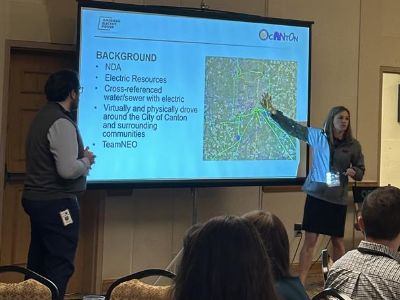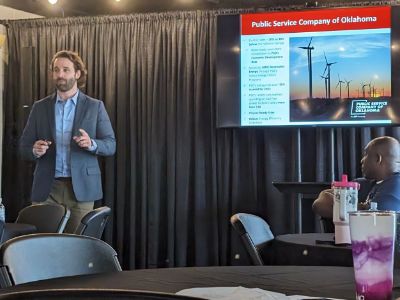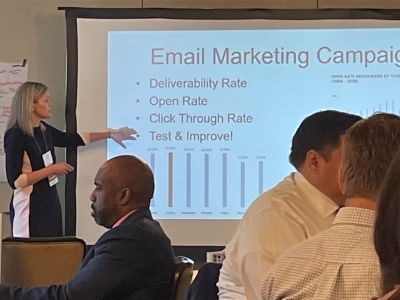
AEP’s economic development professionals are not just experts in their field. They’re training the next generation of experts. Across AEP’s 11-state service territory, they lead courses for community leaders and other economic developers, equipping everyone with the skills and knowledge to build healthy economies for their communities.
The Ohio Economic Development Association’s (OEDA)’s Basic Economic Development course is the first step in a comprehensive professional development curriculum. Liberty Boyd, economic and business development manager in Ohio, was one of the instructors for the 2024 session. The course provides an intensive training experience for economic development partners, local government officials, community leaders and others who are new to the economic development profession or those who want a refresher class on basic practices.
Boyd teamed up with Chris Hardesty, City of Canton economic development director, to teach a session specifically focused on utility-first economic development. Their presentation emphasized the critical relationship between a local economic development organization and utility providers.
I have been fighting to try to get utilities into this since I started with the company six years ago, because utilities are such a core part of economic development, and we’re often overlooked,” Boyd said. “A lot of people tend to think that we take the back seat and don't realize how often we can actually be the drivers when it comes to site selection.
“If you don’t have the electric, the gas, the fiber, the water and sewer there, you just have a field.”

Ultimately the professional training benefits state, regional and local communities, helping arm leaders with the foundational tools to drive development, secure investments and create jobs.
In Oklahoma, Garrett Wright, economic and business development manager, is also teaching other leaders how to better their communities. Every quarter, he presents topics to the Oklahoma Department of Commerce business recruitment and research teams. The sessions keep them informed about what’s happening across AEP’s service territories and the energy industry overall.
“I get asked to do training and economic development overviews for communities and leadership classes,” Wright said. “I get to talk about what we are doing to support economic development and provide basic foundational knowledge. Everything from site selection to business expansion, so people know what goes into economic development.”
Learning the basics enables leaders to directly support their communities. AEP has been dedicated to building thriving economies across the communities we serve for more than 50 years.
While some economic developers take in-person classes, an innovative e-learning course is proving to be in demand. Janet Smith, economic and business development director in Oklahoma, came up with the idea for the Energizing Economic Development course. This class is not just for economic developers, but for anyone interested in supporting economic growth.

“It’s geared toward community leaders, giving foundational knowledge for what’s needed to drive economic development,” Smith said.
Helping community leaders become better at their jobs, able to attract and retain more companies, ultimately benefits the community’s taxpayers, bringing capital investment across the region.
To date, about 1,000 people have registered for the course.
Amy Koscielak, economic and business development senior manager, taught three classes at the University of Oklahoma Economic Development Institute's certification program. Koscielak, who was recently appointed to the OU EDI board as the mentoring program chair, led sessions on digital marketing, research, and technology.
"Teaching is a rewarding experience, it is a great opportunity to interact, share and learn from other economic developers from across the country," Koscielak said.
AEP’s economic development team is one central group across 11 states, which allows them to have a good insight as to what is going on in the market. This gives them the ability to share best practices at high levels and better understand what industries are driving economic growth across the U.S.